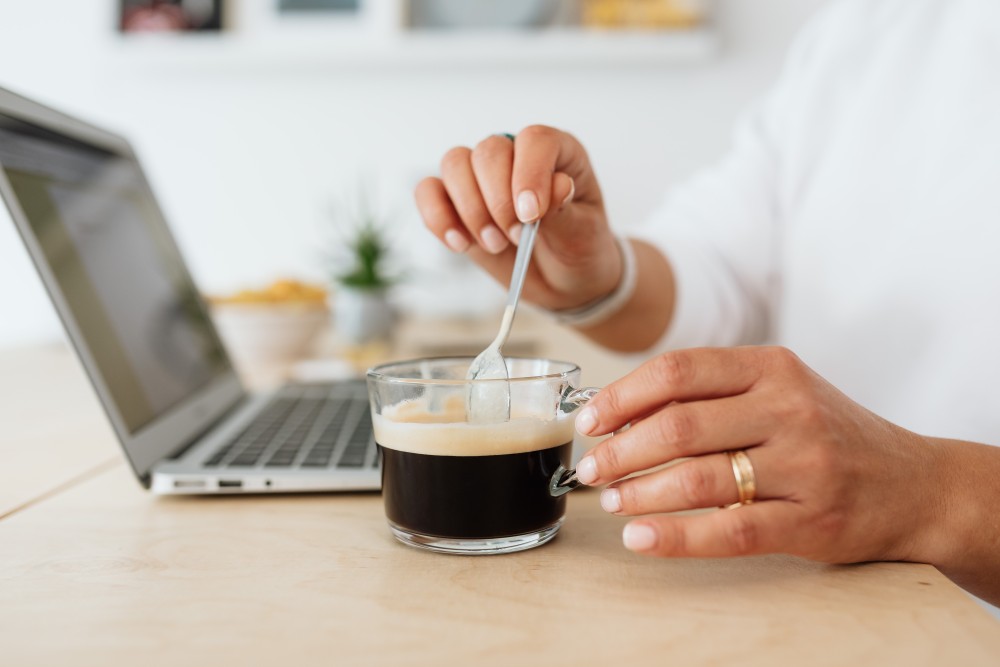Jump to:
Some of us struggle with the shakes and the jitters when we drink too much caffeine. If you’re in that bucket, you might want to switch to drinking decaf coffee instead of regular coffee.
But, does decaf taste different and will drinking it ruin your coffee experience? Let’s find out in this handy guide!
What Is Decaf Coffee?

In order to understand whether decaf coffee tastes different from regular coffee, we’ve got to talk about what decaf coffee actually is.
Decaf coffee is regular coffee that has undergone extra processing to remove the caffeine. Now, while you can never completely eliminate caffeine from coffee, you can certainly get rid of quite a bit of the caffeine.
In general, decaf coffee only contains 0.1% caffeine, which isn’t very much.
As a result, in one serving of the drink, the amount of caffeine decreases from the usual 80-100 milligrams to just 3 mg.
The Health Benefits of Decaf Coffee
Decaf coffee is a great choice for individuals who are pregnant or who struggle with high blood pressure.
The fact that the coffee has most of the caffeine removed means that individuals can enjoy their favorite hot drink without running into any health issues from the caffeine.
Decaf coffee has other health benefits, too. A cup of decaffeinated coffee contains:
- 4% of the recommended daily intake of magnesium
- 8% of the recommended daily value of potassium
- and 2.5% of the recommended daily amount of niacin or vitamin B3.
It might seem like just a drop in the ocean, but if you drink 2-3 (or more!) cups of coffee a day, these nutrients can really add up.
On top of that, decaf coffee contains quite a few antioxidants. Antioxidants help destroy free radicals and keep you at your healthiest.
The Taste of Decaf Coffee vs Regular Coffee
Okay, so we know that decaf coffee contains very little caffeine. But what about the taste?
Well, thanks to the way that decaf coffee is processed, it sometimes has a slightly more acidic flavor than regular coffee.
Many people attribute the slightly more acidic flavor of decaf coffee to its grind. Decaffeinated beans are dried and soaked before being roasted. This can lead to a drier end product.
As a result, the beans are more bitter than a coarser, caffeinated beans because they’re drier. That’s not always the case, however, and many people don’t notice any difference in the flavor at all!

What Makes Decaf Different
Okay, so if the flavor of decaf and regular is the same, what actually makes decaf different? Well, it’s all about the extraction method.
To remove the caffeine from your coffee beans, roasters heat and steep regular coffee beans. This helps pull the caffeine out of the beans.
That’s it! Apart from that, decaf and regular beans are pretty much the same.
How Decaf Coffee Is Made
Decaf coffee has a different process than regular coffee. That’s because manufacturers have to pull the caffeine out of the beans.
There are two main ways that manufacturers can do this. One is a natural method that uses only water to extract the caffeine. The other method is a chemical process.
Let’s take a quick look at each one and how it works.
The Natural Method (With Water)
Let’s start with the natural method.
The natural method involves soaking green coffee beans in water for many hours. This allows the caffeine in the beans to dissolve in the water.
Then, this caffeine-filled water is passed over a bed of activated carbon that will absorb all the caffeine.
Next, manufacturers use heat to dry the beans before cooling them and roasting them. From there the beans are ready to be packaged up and shipped off for sale!

The Chemical Method (With Methane Dichloride)
The other way to extract caffeine is using methane dichloride.
For this method, you’ll start by steaming the coffee beans. Then, add the methane dichloride to the water that you’re steaming the beans with.
The chemical concentration of the methane dichloride is strictly controlled. That way, manufacturers can assure that there’s no risk of harm to a coffee drinker’s health.
The entire caffeine elimination process lasts about 30 minutes. Some manufacturers may need to repeat the process a few times to fully extract the caffeine.
Finally, the coffee beans are thoroughly rinsed with clean water to remove the chemical. The manufacturers then roast the beans and package them up.
Frequently Ask Questions
Do you have a few lingering questions about decaf coffee and its caffeine content? You’re not the only one. Here are the answers to a couple of frequently asked questions.
What Is the Difference Between Decaf and Normal Coffee?
To be considered decaffeinated, at least 97% of the caffeine in regular coffee has to be eliminated. On the other hand, the only caffeine that’s eliminated from regular coffee comes from the roasting and brewing process, rather than intentional extraction.
How Healthy Is Decaf Coffee?
Decaf coffee has a ton of health benefits, including being rich in potassium and potentially promoting good circulation. It may also be helpful for regulating blood pressure. However, there’s no hard evidence that it’s healthier than regular coffee.
What Has More Caffeine, Decaf Coffee or Tea?
Decaffeinated coffee and tea both have less caffeine than regular tea and coffee. But, they also still contain caffeine. Decaf coffee typically contains 2 to 15 milligrams in an 8-ounce cup and tea has slightly less.
Does Decaf Taste Different – Conclusion
So, does decaf taste different from regular coffee? It depends!
While some people don’t notice the difference between regular and decaf coffee, others say it has a slightly different taste.
But, in general, decaffeinated coffee is still coffee.
What do you think? Do you think that decaffeinated coffee tastes different? Next time you take a sip, pay attention to your brew!







